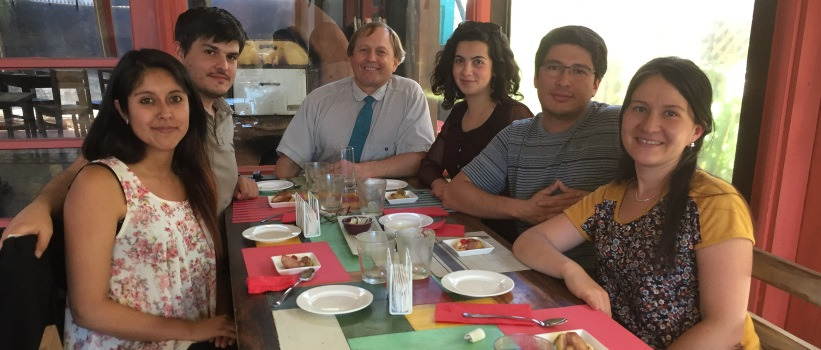March 16, 2017 | Erin Bluvas, bluvase@sc.edu
With a single two-week trip to Austral University of Chile (UACh), Associate Professor Jim Burch (Department of Epidemiology and Biostatistics) managed to establish multiple opportunities for partnering with the Valdivia-based institution. The project began when Burch received a Fulbright Specialist Program grant from the U.S. Department of State.
This program sends U.S. faculty and professionals to overseas academic institutions to serve as expert consultants on curriculum, faculty development, organizational planning, and other topics for periods of two to six weeks. Burch brought his expertise to UACh’s Institute of Public Health and School of Medicine to help strengthen the faculty and student expertise in epidemiology, biostatistics, and environmental and public health. Through faculty meetings, research seminars, and workshops, Burch taught and discussed these topics with faculty and doctoral students, prioritizing cancer epidemiology at their request.
“The worldwide cancer burden has been steadily increasing due to population growth, aging, the widespread adoption of cancer-causing lifestyles, and the release on carcinogenic agents to the environment. Developing countries are expected to bear a disproportionate burden of cancer incidence and mortality in upcoming years,” says Burch. “In Chile, cancer is the second leading cause of death, and the relative burden of cancer mortality has nearly tripled over the last several decades.”
UACh administrators expressed an interest in developing the content of Burch’s workshops and seminars to develop and implement a course on “Public Health and the Environment” for academic credit through the USC Study Abroad Office. Chilean faculty members, many of whom felt there was a lack of epidemiology in their public health training, would like to continue learning more about the field through future collaborations.
In addition to enhancing UACh student’ knowledge in these areas, Burch also explored collaborative research opportunities between UofSC and UACh faculty. These discussions included possible partnerships with the Chilean Ministry of Health, the regional authority on issues related to health standards compliance, and programs to improve the health and well-being of those living in the los Rios region.
One opportunity would combine Burch’s expertise in cancer epidemiology with the UACh Institute of Public Health’s research in gallbladder and gastric cancer in the Rios region. Together, the universities could explore the currently unexplained causes for Chile’s excessively high mortality rates for gallbladder cancer compared to other nations around the world. A second collaborative opportunity would marry another area of Burch’s expertise (i.e., role of circadian rhythm and sleep disruption on cancer risk) with similar research conducted at UACh’s Institute of Anatomy, Histology, and Pathology.
Burch’s inaugural trip to UACh proved to be a groundbreaking first step in establishing collaborative opportunities in both education and research. With numerous avenues of mutual interest to pursue, these partnerships serve to further strengthen UofSC’s efforts to increase our international presence.
“USC’s faculty and staff have established a Global Health Initiative with the goal of responding to global health challenges by promoting collaborative research and practice among students, faculty, and stakeholders around the world,” says Burch. “As a member of this core USC affinity group, I am planning to integrate the goals and objectives of this Fulbright project into USC’s Global Health Initiative.”
